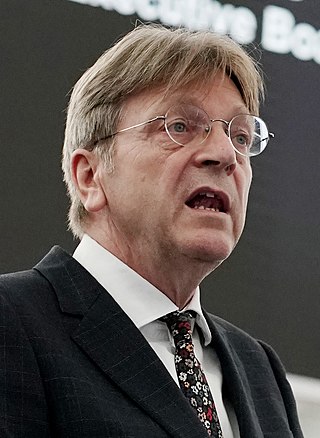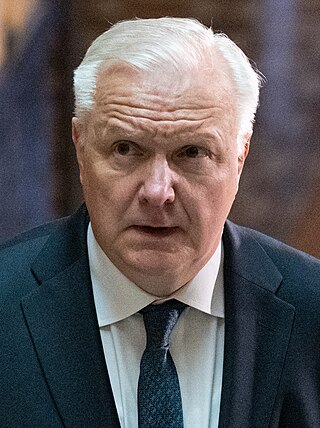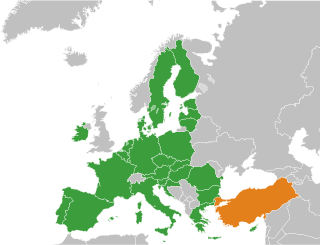| |||||
| Decades: | |||||
|---|---|---|---|---|---|
| See also: | |||||
Events of 2019 in the European Union.
| |||||
| Decades: | |||||
|---|---|---|---|---|---|
| See also: | |||||
Events of 2019 in the European Union.

The European Council is a collegiate body that defines the overall political direction and priorities of the European Union. The European Council is part of the executive of the European Union (EU), beside the European Commission. It is composed of the heads of state or government of the EU member states, the President of the European Council, and the President of the European Commission. The High Representative of the Union for Foreign Affairs and Security Policy also takes part in its meetings.

Guy Maurice Marie Louise Verhofstadt is a Belgian liberal politician and an advocate of a Federal Europe. He is a former prime minister of Belgium. He has been a member of the European Parliament (MEP) from Belgium since 2009.

The president of the European Council is the person presiding over and driving forward the work of the European Council on the world stage. This institution comprises the college of heads of state or government of EU member states as well as the president of the European Commission, and provides political direction to the European Union (EU).

Donald Franciszek Tusk is a Polish politician and historian who has served as prime minister of Poland since 2023. Tusk previously served as prime minister from 2007 to 2014, and as president of the European Council from 2014 to 2019. He co-founded the Civic Platform (PO) party in 2001 and has served as its long-time leader, first from 2003 to 2014 and again since 2021. He was also the president of the European People's Party (EPP) from 2019 to 2022.

Olli Ilmari Rehn is a Finnish economist and public official who has been serving as governor of the Bank of Finland since 2018. A member of the Centre Party, he previously served as the European Commissioner for Enlargement from 2004 to 2010, European Commissioner for Economic and Monetary Affairs and the Euro from 2010 to 2014, and Minister of Economic Affairs in Juha Sipilä's cabinet from 2015 until 2016. Rehn is running for President of Finland in 2024.

Turkey is negotiating its accession to the European Union (EU) as a member state, following its application to become a full member of the European Economic Community (EEC), the predecessor of the EU, on 14 April 1987.

The European Union (EU) is a political and economic union of 27 member states that are party to the EU's founding treaties, and thereby subject to the privileges and obligations of membership. They have agreed by the treaties to share their own sovereignty through the institutions of the European Union in certain aspects of government. State governments must agree unanimously in the Council for the union to adopt some policies; for others, collective decisions are made by qualified majority voting. These obligations and sharing of sovereignty within the EU make it unique among international organisations, as it has established its own legal order which by the provisions of the founding treaties is both legally binding and supreme on all the member states. A founding principle of the union is subsidiarity, meaning that decisions are taken collectively if and only if they cannot realistically be taken individually.

The Schengen Area is an area comprising 27 European countries that have officially abolished passports and many other types of border control at their mutual borders. Being an element within the wider area of freedom, security and justice policy of the European Union (EU), it mostly functions as a single jurisdiction under a common visa policy for international travel purposes. The area is named after the 1985 Schengen Agreement and the 1990 Schengen Convention, both signed in Schengen, Luxembourg.

There are nine recognised candidates for membership of the European Union: Albania, Bosnia and Herzegovina, Georgia, Moldova, Montenegro, North Macedonia, Serbia, Turkey, and Ukraine. Kosovo formally submitted its application for membership in 2022 and is considered a potential candidate by the European Union.
Events from the year 1999 in the European Union.

The history of the European Union between 1993 and 2004 was the period between its creation and the 2004 enlargement. The European Union was created at the dawn of the post–Cold War era and saw a series of successive treaties laying the ground for the euro, foreign policy and future enlargement. Three new member states joined the previous twelve in this period and the European Economic Area extended the reach of the EU's markets to three more.

The accession of North Macedonia to the European Union has been on the current agenda for future enlargement of the EU since 2005, when it became an official candidate for accession. The Republic of Macedonia submitted its membership application in 2004, thirteen years after its independence from Yugoslavia. It is one of nine current EU candidate countries, together with Albania, Bosnia and Herzegovina, Georgia, Moldova, Montenegro, Serbia, Turkey and Ukraine.

The Comprehensive Economic and Trade Agreement (CETA) is a free-trade agreement between Canada and the European Union and its member states. It has been provisionally applied, thus removing 98% of the preexisting tariffs between the two parts.

The history of the European Union from 2004 to the present is the current timeline of the European Union. It is a period of significant upheaval and reform following the 2004 enlargement of the European Union. The EU has taken on ten new members, eight of which were initially much poorer than the EU average, and took in a further two in 2007 with many more on the way. It created the euro a few years before and had to expand this, and the Schengen Area to its new members. However this was overshadowed by the late-2000s recession and damaging disputes over the European Constitution and its successor, the Treaty of Lisbon. Throughout this period, the European People's Party has been the largest group in the European Parliament and provides every President of the European Commission.

The European Conservatives and Reformists Party, formerly known as Alliance of European Conservatives and Reformists (AECR) (2009–2016) and Alliance of Conservatives and Reformists in Europe (ACRE) (2016–2019), is a conservative, soft Eurosceptic European political party with a main focus on reforming the European Union (EU) on the basis of Eurorealism, as opposed to total rejection of the EU (anti-EU-ism).
This is a list of 2014 events that occurred in Europe.

George Ciamba was a Romanian diplomat who served, from November 2018 to November 2019, as the Romanian Minister for European Affairs, including during Romania's 2019 first presidency of the Council of the European Union.

Relations between the European Union (EU) and Turkey were established in 1959, and the institutional framework was formalized with the 1963 Ankara Agreement. Albeit not officially part of the European Union, Turkey is one of the EU's main partners and both are members of the European Union–Turkey Customs Union. Turkey borders two EU member states: Bulgaria and Greece.

Victor Negrescu is a Romanian politician of the Social Democratic Party. He is a Member of European Parliament and he was Minister Delegate for European Affairs in the government of Romania between 2017 and 2018. Since 2007, he is the president and national coordinator of the Romanian network of PES activists.

The Directive on Copyright in the Digital Single Market, formally the Directive (EU) 2019/790 of the European Parliament and of the Council of 17 April 2019 on copyright and related rights in the Digital Single Market and amending Directives 96/9/EC and 2001/29/EC, is a European Union (EU) directive which has been adopted and came into force on 7 June 2019. It is intended to ensure "a well-functioning marketplace for copyright". It extends existing European Union copyright law and is a component of the EU's Digital Single Market project. The Council of the European Union describes their key goals with the Directive as protecting press publications; reducing the "value gap" between the profits made by Internet platforms and by content creators; encouraging collaboration between these two groups, and creating copyright exceptions for text- and data-mining.